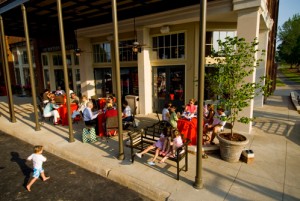A Placemaking Journal
Traditional Cities and Towns: Incubators of incompetent children

First off, before I’m assaulted by urban defenders in an all-out flame war, let me clarify that my tongue is planted firmly in cheek here. A little background:
I’ve written before on the intersection between traditional / smart growth environments and child-rearing, first at the level of the neighborhood and then, later, at the level of the house. Those posts reflect my steadfast belief that, while our modern consumer society happily provides all sorts of work-arounds to help us manage our parenting challenges, historic patterns of human settlement actually had more meaningful solutions built right in.
I live in a traditional town and am surrounded daily by anecdotal evidence reinforcing my cities-are-good-for-kids instincts, not just with my own child but with other kids too. But then I started thinking: I wonder if there are aspects of modern life, routinely accepted as normal, that my child won’t be prepared for. As she nears adulthood, are there experiences destined to confound her, all because I’ve chosen to raise her in a traditional, urban environment?
Turns out, there are. For example:

She may suck at getting to places on time. All her life, almost everything she’s done has been within a five or ten minute walk, bike ride or drive. School, friends, church, doctor, dance, shopping and parks. With that kind of window, even if you don’t leave the house until the time you’re supposed to be somewhere, you still get there pretty much on time. God forbid she ever land a job with a 30-60 minute commute. The chasm between doing something in one place and doing it in another will seem insurmountable.
She may be a terrible driver. When all your friends, all your activities, and lots of shopping are a short walk or bike ride away, there’s not a whole lot of incentive for a teenager to spend much time driving. After all, driving takes money for gas and parking while the other modes are all free. It also requires sucking up to Dad for the car which, for a teen, is an even greater disincentive. Thus, should she find herself in an auto-dependent environment at some point in her life, I apologize in advance to all the other drivers on the road.
She may be devastated by saying goodbye. When I was growing up in the ‘burbs and we reached the end of elementary school, our class was split up according to where we lived and we were shipped off to a host of different regional middle schools. Then we were splintered again when different zones dictated all different high schools. By the time I was a senior, I had said a permanent goodbye to more friends than I could count. In contrast, here in my little town, kids start off in their neighborhood school and then, beginning 4th grade, all neighborhood schools combine. At that point, they’re among the exact same classmates they’ll be graduating with nine years later. Contrast that with what she’ll likely experience in the workforce: Friends jumping ship every couple of years. I hope she can handle it.
She may fail to realize that services often cost money. One aspect of living in a walkable neighborhood is that you meet a lot of people and make a lot of friends. Diverse friends with all kinds of skills and interests. And one aspect of having all these folks around, especially close by, is that it amounts to a lot of people willing to help you with things — moving heavy objects, building things, fixing things, watching your kid, or having hot meals provided in times of difficulty. I fear my child has come to believe that this is normative. Thus, if the day ever comes in which she finds herself in a more conventional place — where it’s harder to meet and befriend a wide and diverse collection of neighbors — she may be shocked to discover that there are people called “movers” or “handymen” or “mechanics” or “daycare workers” or “caterers” that expect money to do those sorts of things.
She may be dumbfounded to find that some people think separating jobs, shops, parks, services and churches from where they live is a good idea. If her circumstances ultimately lead her to some outlying bedroom community, and that community begins investing in its own future by exploring ideas like zoning reform, downtown development, or suburban retrofitting, it’ll surely feel to her like one step closer to home. I can see her embracing the idea and wanting to share her enthusiasm. And that’s the point at which she’ll discover that some folks like things just the way they are. That they’re a willing participant in car-culture and wouldn’t have it any other way. And I fear that that’s the point at which she’ll exceed her capacity for humoring delusional thinking and her head just might explode. Which is not what I, as her parent, want. At all.

So there you have it. Mounting evidence that, in embracing timeless and proven models, I may very well be the worst parent alive. Or not. I guess it all depends on how much credence you give critics like James Howard Kunstler, and how much you choose to believe that our auto-dominated suburban nation exists as a permanent condition.
Me? I think I’ll stick with what I’ve been doing.
–Scott Doyon
If PlaceShakers is our soapbox, our Facebook page is where we step down, grab a drink and enjoy a little conversation. Looking for a heads-up on the latest community-building news and perspective from around the web? Click through and “Like” us and we’ll keep you in the loop.









